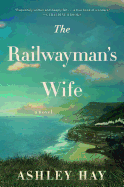
In this subtly radiant drama, Ashley Hay draws an intimate map of the bereaved heart against the picturesque backdrop of a seaside Australian town in 1948. If every person deals differently with grief, so, too, should novels; Hay uses moments of raw, overwhelming outward emotion in her characters sparingly in favor of rich inner lives and introspection.
Anikka Lachlan leads a quiet, wholesome life with her husband, Mackenzie, and young daughter, Isabel, in postwar Thirroul, New South Wales. Mac works for the railway while Ani keeps house. They are loving parents, "people who make a fuss of birthdays, people for whom no effort is too great in search of the perfect present." Although Mac came from Scotland, where "Around the turn of autumn, the turn of spring, the sky might light up with the aurora, sheets of grand brilliance," so many years have passed since he left that he has made a sort of peace with never returning. A native Australian, Ani is nevertheless a transplant herself, having moved to Thirroul with Mac from her birthplace in the distant Hay Plains "with its grasses as blond as her hair." Fond of their adopted hometown, still in love with each other after years of marriage, spared direct contact with World War II since the railway needed Mac to stay at home, the Lachlans have nothing but a pleasant future waiting for them.
Then the unthinkable happens, and Ani's life jumps off its rails. She imagines a "searchlight has found her, catching her in its sweep and pinning her, arbitrary and irrevocable," announcing to the world that a train accident killed Mac and made her a widow. She cannot escape the pain of the loss, waking to wonder "how late it must be for the sun to already be so high and then remembers, in the next instant, what happened the day before." With their daughter to think of, Ani has no choice but to struggle through her grief, "[a]s if she will ever care what anything is or isn't again." She accepts the offer of a job at the Railway Institute's library, one branch in a network that transports books to patrons via train. However, losing Mac continues to eat away at her heart.
Ani's compatriots in the land of despair are Frank Draper and Roy McKinnon, survivors of World War II's European theater who have only recently returned home to Thirroul. Frank, a doctor, wears his cynicism on his sleeve after participating in a concentration camp liberation, watching helplessly as many of the freed prisoners died, too far gone for medical help. Roy, a soldier, achieved some acclaim as a poet during the war but has returned with no words or inspiration, just insomnia and guilt because "Frank Draper could hold those five hundred souls on the knife edge of his conscience for as long as he liked, but it was nothing compared to seeing a man, and lining him up, and pulling a trigger, and watching him fall."
Hays lovingly constructs a rich snapshot of late '40s Thirroul, with its sea air, endless skies and thundering locomotives, which will leave American readers nostalgic for a place most have never visited. The charm of the setting makes her unpacking of the scars war left on its inhabitants feel gentler but still stands in stark relief, a reminder that war echoes into every corner of the world.
Hay's quiet, graceful prose acts as a translucent overlay for turbulent emotion, like glimpsing rich velvet through wisps of lace. While Ani breaks down when she hears of Mac's death, she then travels a generally subdued and realistic path of depression, losing her illusions of control over her life. Hay keeps a tight focus on Ani's struggle but allows for bright spots, too. Ani's growing friendship with Roy acts as a balm for both, and her position at the library also provides some grace. Through her characters, Hay includes many laudatory references to libraries and literature. Even before her employment, Ani thinks of the library that "[s]he could walk inside and step into a murder, a love story, a complete account of somebody else's life, or mutiny on the high seas. Such potential, such adventure--there's a shimmer of malfeasance in trying other ways of being." Characters look to literature to better their lives: Roy looks for meaning, Ani for escape. "You can find anything in a story if you look hard enough," suggests the retiring librarian Ani replaces.
The climax and ending are perhaps Hay's greatest coup, situations filled with such pathos that rather than shroud them in mystery, she leaves their pieces gleaming in the light for a reader to assemble ahead of the characters, then lets the reader helplessly follow events to their inevitable conclusion. Fittingly for the story, this finale surrounds a poem written by Roy--composed in real life by poet Stephen Edgar--that captures the grace and light of both Ani and her home, and the thought that anything as innocent and beautiful as these bits of verse could cause strife only adds to the juxtaposition of loveliness and grief at every turn. This thoughtful, elegant portrait of lives turned inside-out and finding the way forward from despair is sure to find a place in the hearts of its audience. --Jaclyn Fulwood

